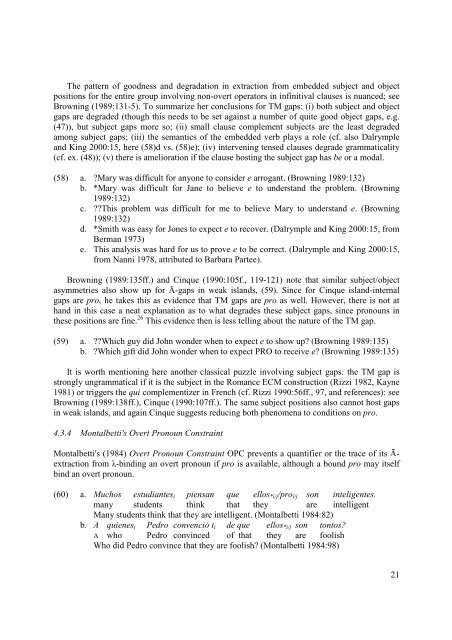1 On tough-movement* Milan Rezac, University ... - Multimania.co.uk
1 On tough-movement* Milan Rezac, University ... - Multimania.co.uk
1 On tough-movement* Milan Rezac, University ... - Multimania.co.uk
You also want an ePaper? Increase the reach of your titles
YUMPU automatically turns print PDFs into web optimized ePapers that Google loves.
The pattern of goodness and degradation in extraction from embedded subject and object<br />
positions for the entire group involving non-overt operators in infinitival clauses is nuanced; see<br />
Browning (1989:131-5). To summarize her <strong>co</strong>nclusions for TM gaps: (i) both subject and object<br />
gaps are degraded (though this needs to be set against a number of quite good object gaps, e.g.<br />
(47)), but subject gaps more so; (ii) small clause <strong>co</strong>mplement subjects are the least degraded<br />
among subject gaps; (iii) the semantics of the embedded verb plays a role (cf. also Dalrymple<br />
and King 2000:15, here (58)d vs. (58)e); (iv) intervening tensed clauses degrade grammaticality<br />
(cf. ex. (48)); (v) there is amelioration if the clause hosting the subject gap has be or a modal.<br />
(58) a. ?Mary was difficult for anyone to <strong>co</strong>nsider e arrogant. (Browning 1989:132)<br />
b. *Mary was difficult for Jane to believe e to understand the problem. (Browning<br />
1989:132)<br />
c. ??This problem was difficult for me to believe Mary to understand e. (Browning<br />
1989:132)<br />
d. *Smith was easy for Jones to expect e to re<strong>co</strong>ver. (Dalrymple and King 2000:15, from<br />
Berman 1973)<br />
e. This analysis was hard for us to prove e to be <strong>co</strong>rrect. (Dalrymple and King 2000:15,<br />
from Nanni 1978, attributed to Barbara Partee).<br />
Browning (1989:135ff.) and Cinque (1990:105f., 119-121) note that similar subject/object<br />
asymmetries also show up for Ā-gaps in weak islands, (59). Since for Cinque island-internal<br />
gaps are pro, he takes this as evidence that TM gaps are pro as well. However, there is not at<br />
hand in this case a neat explanation as to what degrades these subject gaps, since pronouns in<br />
these positions are fine. 26 This evidence then is less telling about the nature of the TM gap.<br />
(59) a. ??Which guy did John wonder when to expect e to show up? (Browning 1989:135)<br />
b. ?Which gift did John wonder when to expect PRO to receive e? (Browning 1989:135)<br />
It is worth mentioning here another classical puzzle involving subject gaps: the TM gap is<br />
strongly ungrammatical if it is the subject in the Romance ECM <strong>co</strong>nstruction (Rizzi 1982, Kayne<br />
1981) or triggers the qui <strong>co</strong>mplementizer in French (cf. Rizzi 1990:56ff., 97, and references): see<br />
Browning (1989:138ff.), Cinque (1990:107ff.). The same subject positions also cannot host gaps<br />
in weak islands, and again Cinque suggests reducing both phenomena to <strong>co</strong>nditions on pro.<br />
4.3.4 Montalbetti's Overt Pronoun Constraint<br />
Montalbetti's (1984) Overt Pronoun Constraint OPC prevents a quantifier or the trace of its Ā-<br />
extraction from λ-binding an overt pronoun if pro is available, although a bound pro may itself<br />
bind an overt pronoun.<br />
(60) a. Muchos estudiantes i piensan que ellos *i/j /pro i/j son inteligentes.<br />
many students think that they are intelligent<br />
Many students think that they are intelligent. (Montalbetti 1984:82)<br />
b. A quienes i Pedro <strong>co</strong>nvenció t i de que ellos *i/j son tontos?<br />
A who Pedro <strong>co</strong>nvinced of that they are foolish<br />
Who did Pedro <strong>co</strong>nvince that they are foolish? (Montalbetti 1984:98)<br />
21
















